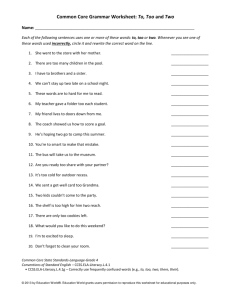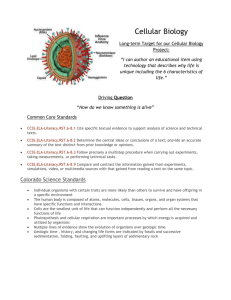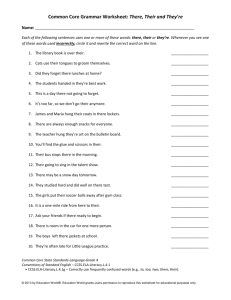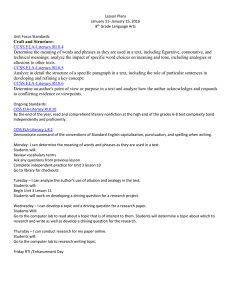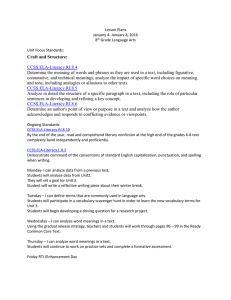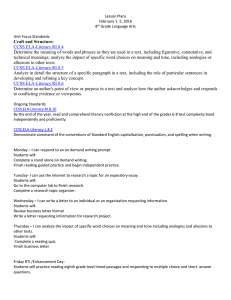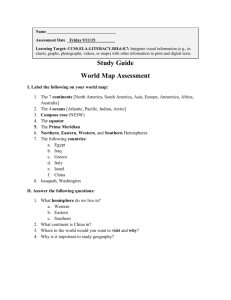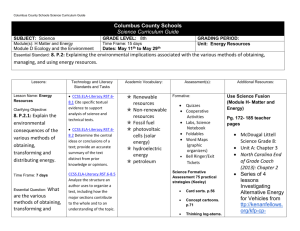Making Frameworks Work: Using the ACRL and Common Core
advertisement
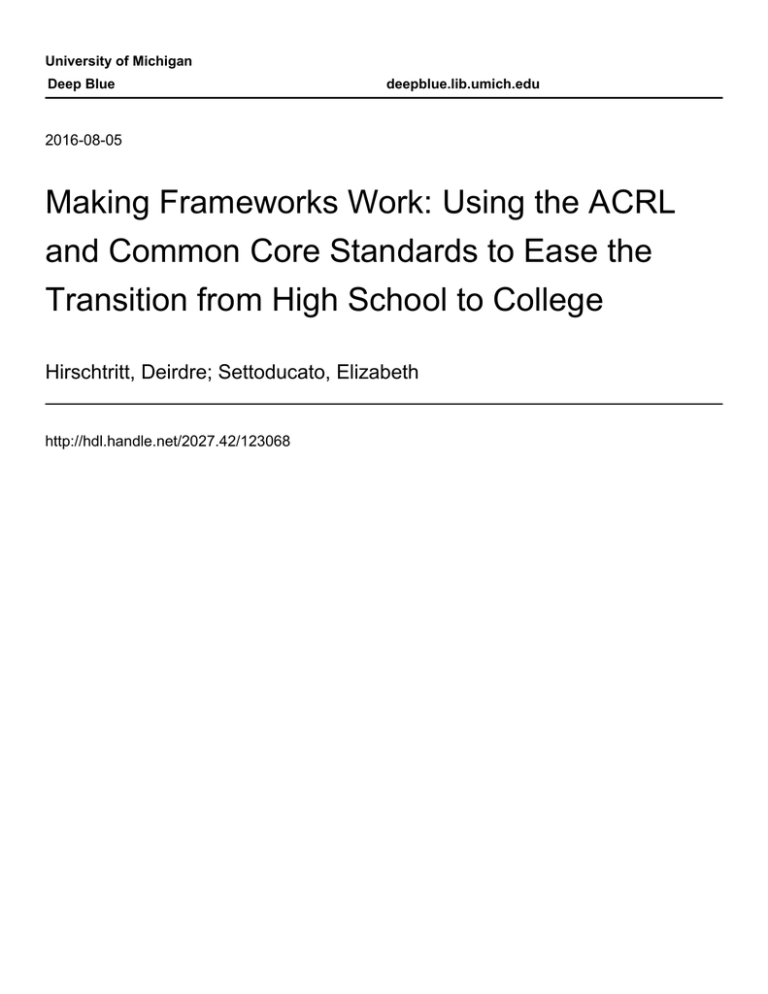
University of Michigan Deep Blue deepblue.lib.umich.edu 2016-08-05 Making Frameworks Work: Using the ACRL and Common Core Standards to Ease the Transition from High School to College Hirschtritt, Deirdre; Settoducato, Elizabeth http://hdl.handle.net/2027.42/123068 Making Frameworks Work: Using the ACRL Framework and Common Core Standards to Ease the Transition from High School to College Deirdre Hirschtritt| dbhirsch@umich.edu Liz Settoducato | esetto@umich.edu Who We Are… Liz Settoducato Deirdre Hirschtritt University Library Associates (ULAs) at the University of Michigan Libraries Context + Background Meaningfully integrate ACRL Framework into instruction Support students by bridging the gap between high school & college Turn standards students already know into a roadmap for successful research ? Why Common Core Science? Crosswalks and Correlations (1) Common Core English Language Arts Standards » Science & Technical Subjects » Grade 11-12 ACRL Framework for Information Literacy for Higher Education CCSS.ELA-LITERACY.RST.11-12.2 - Determine the central ideas or conclusions of a text; summarize complex concepts, processes, or information presented in a text by paraphrasing them in simpler but still accurate terms. Research as Inquiry CCSS.ELA-LITERACY.RST.11-12.5 - Analyze how the text structures information or ideas into categories or hierarchies, demonstrating understanding of the information or ideas. CCSS.ELA-LITERACY.RST.11-12.6 - Analyze the author's purpose in providing an explanation, describing a procedure, or discussing an experiment in a text, identifying important issues that remain unresolved. Crosswalks and Correlations (2) Common Core English Language Arts Standards » Science & Technical Subjects » Grade 11-12 ACRL Framework for Information Literacy for Higher Education CCSS.ELA-LITERACY.RST.11-12.4 - Determine the meaning of symbols, key terms, and other domain-specific words and phrases as they are used in a specific scientific or technical context relevant to grades 11-12 texts and topics. Information Has Value CCSS.ELA-LITERACY.RST.11-12.8 - Evaluate the hypotheses, data, analysis, and conclusions in a science or technical text, verifying the data when possible and corroborating or challenging conclusions with other sources of information. CCSS.ELA-LITERACY.RST.11-12.10 - By the end of grade 12, read and comprehend science/technical texts in the grades 11-CCR text complexity band independently and proficiently. Crosswalks & Correlations (3) Common Core English Language Arts Standards » Science & Technical Subjects » Grade 11-12 ACRL Framework for Information Literacy for Higher Education CCSS.ELA-LITERACY.RST.11-12.1 Cite specific textual evidence to support analysis of science and technical texts, attending to important distinctions the author makes and to any gaps or inconsistencies in the account. Authority is Constructed and Contextual CCSS.ELA-LITERACY.RST.11-12.7 Integrate and evaluate multiple sources of information presented in diverse formats and media (e.g., quantitative data, video, multimedia) in order to address a question or solve a problem. Scholarship as Conversation Compare to frequency of other Framework ideas Research as Inquiry Information Has Value Information Creation as a Process Searching as Strategic Exploration Scholarship as a Conversation Authority is Constructed and Contextual Case Study - Introduction ● Instructor request for 90 minute information literacy session ● Course in the English department: “Race in the Age of Obama” ● Primary learning outcome: students will be able to critically and effectively evaluate sources for relevance and usefulness in future assignments Case Study - Choice of Articles Case Study - What I Did (1) Introduced students to activity - told them to find these two articles through our website (2) Gave students 5 minutes to skim both articles - gave them tips for doing this effectively (3) Facilitated whole group conversation about what differentiates these articles (4) Asked, “How would you use these articles in a paper for class?” Case Study - What Could Be Improved Recommended Change in Lesson Plan Common Core English Language Arts Standards » Science & Technical Subjects » Grade 11-12 ACRL Framework for Information Literacy for Higher Education Have students discuss the differences between the articles among themselves first; encourage peer learning CCSS.ELA-LITERACY.RST.11-12.7 Integrate and evaluate multiple sources of information presented in diverse formats and media (e.g., quantitative data, video, multimedia) in order to address a question or solve a problem. Scholarship as a Conversation Ask questions that are explicitly connected to learning objectives CCSS.ELA-LITERACY.RST.11-12.1 - Cite specific textual evidence to support analysis of science and technical texts, attending to important distinctions the author makes and to any gaps or inconsistencies in the account. Authority is Constructed & Contextual + Scholarship as a Conversation Moving Forward - Better Questions to Ask Who is/are the author(s)? Do you trust them? Why? What is the newsource? Is it reliable? Why? When was the source published? Does it matter? Why? Could you verify the contents of the article (if you wanted to)? What’s the purpose of the article? Who’s the intended audience of the article? Strategies for Your Classroom Show, don’t tell Let students lead Connect learning objectives to Framework ideas Thank You! Access these slides online: bit.ly/ccssACRL Contact us: Deirdre Hirschtritt | dbhirsch@umich.edu Liz Settoducato | esetto@umich.edu
